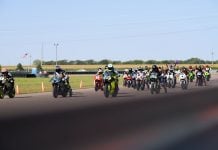Copyright 2001, Roadracing World Publishing, Inc.
By David Swarts
For the last seven years, the AMA has acted in a less-than-truthful manner with Roger Edmondson, the AMA membership, the media, and who knows how many others. Even now, after the Fourth Circuit Court of Appeals has rendered its verdict in the AMA versus Roger Edmondson matter, the AMA issued a press release that is not completely accurate. In the release, AMA Chairman of the Board of Trustees, Rick Gray, admitted that the AMA made mistakes, but that admission falls seriously short of the apology that the largest motorcycling organization in the world owes its 270,000 members.
Following the original trial, the AMA issued a February 2, 1999 statement that read, in part, “In late December (1998) a court decision was rendered against the American Motorcyclist Association in a suit filed two years ago by road-race promoter and former AMA contractor Roger Edmondson. The suit arose from the non-renewal in 1994 of contracts under which Edmondson functioned as Road Racing Manager for the AMA National Championship Superbike series, and as administrator for several classes included in that series. Mr. Edmondson contended that he partially owned the AMA’s professional road-racing program by virtue of these agreements.”
In this misleading statement, the AMA tried to portray Edmondson as a disgruntled former employee when he was actually a partner in a joint venture with the AMA. In addition, Edmondson had already relinquished his claim on the classes that he clearly developed. As the Fourth Circuit Court wrote, “At trial, Edmondson testified that he was not claiming that the AMA could not run the 600 or 750 Supersport class without his permission.” This was in spite of the fact that former AMA President Ed Youngblood wrote a memorandum (known in the original trial as Exhibit 102) to the AMA Board of Directors saying Edmondson had “brought the 600 Supersport, 750 Supersport, Harley-Davidson Twin Sports and Endurance classes that he developed with the CCS” to the joint venture.
Now, two years later, in response to the Fourth Circuit’s ruling made public February 2, 2001, the AMA released a February 5 statement that continued to deceive, and said “At the time of his departure from those positions, the AMA entered into negotiations with Edmondson and made a financial offer to terminate the relationship.” In reality, the AMA and Edmondson started negotiations to end the joint venture in October of 1993.
The AMA’s February 2001 document continued, “Those negotiations were unsuccessful”. The negotiations were unsuccessful because the AMA had no intention of them being successful. The Fourth Circuit Court’s decision said, “Somewhere along the way, the AMA decided it wanted to assume control of Edmondson’s interest in the 1994 joint venture without compensating him. Thus, the negotiations between Edmondson and the AMA never reached the point of a signed agreement. In late 1993, Tom Mueller, a vice president of the AMA, directed Roy Janson, the then head of the AMA’s racing department, to prepare a memorandum regarding how the AMA could effect a secret takeover of Edmondson’s interest in the 1994 joint venture. Janson had completed and submitted the requested memorandum by the end of December 1993. In early April 1994, the AMA implemented the secret takeover plan outlined in Janson’s memorandum with a few revisions.”
The AMA’s February 2001 statement continued, “(a)nd Edmondson ultimately formed the North American Sport Bike series, signing contracts with several racetracks that had previously hosted AMA road races. Subsequently, most of those racetracks terminated those contracts and returned to the AMA schedule.” The key here is how the AMA uses the word “subsequently.” The original jury, a Federal District Court Judge, and the Fourth Circuit panel of three appellate court judges all found the same to be true. As the Appeals Court decision stated, “After Edmondson had secured commitments from these three (Mid-Ohio, Road America, and Brainerd ) track owners and several lesser tracks to run his new series, Paradama’s Chairman of the Board, Cary Agajanian, directly contacted the marketing manager for the Mid-Ohio Race Track, John Szymanski, and threatened to cancel other important contracts between the Defendants and the track if the track honored its commitment to Edmondson. The Mid-Ohio Track canceled its contract with Edmondson in response to the threat. The Mid-Ohio Track’s cancellation in turn caused cancellations by the Road America Race Track and Brainerd Race Track. As a result of these events, Edmondson’s new business never got off the ground. He subsequently took a salaried position with the amateur racing company he had sold to his daughter, but ultimately had to file a petition for bankruptcy protection under Chapter 11 of the United States Bankruptcy Code.”
The AMA’s February release continued, “Edmondson then sued the AMA, alleging that the Association had interfered with his racing program.” But that is no longer an allegation. It has been ruled on and is now fact, according to the Fourth Circuit Court, which said “This evidence is sufficient to sustain the jury’s verdict in favor of Edmondson on his tortuous interference with contract claims.”
The AMA’s February 2001 statement read, “‘We felt, and several internal and external legal advisors agreed, that the facts of this case did not justify the damages assessed in the lower court, so we proceeded with the appeal,’ said Rick Gray, chairman of the AMA Board of Trustees. ‘We are pleased that the Court of Appeals listened to our arguments and substantially reduced the damages in this case.'” Here, we have got to give the AMA and their lawyers credit. They were able to have some of the District Court’s judgments reversed and the damages reduced by $3.16 million…temporarily. And no matter what the final outcome of the re-trial, the AMA will have spent nearly $2 million just for its own legal fees when the whole case could have been settled in bankruptcy court for about $50,000 at one point. But the AMA’s “several internal and external legal advisors agreed” to pursue further litigation.
The AMA’s version of reality, as expressed in the February release, further stated ” ‘In 1990, the AMA entered into a joint venture agreement with Edmondson that bound us together contractually,’ Gray noted. ‘By 1993, we realized that we had irreconcilable differences regarding the future of the AMA’s road-racing program, and we sought to find an amicable end to that joint venture agreement.'”
The only irreconcilable differences noted in trial testimony were that the AMA men said that they were getting a lot of complaints about Edmondson’s management style and his flaunting a lavish lifestyle with Rolex watches and expensive motorhomes. Does this mean that nobody complains about the way AMA Pro Racing is being run now that Edmondson is gone? Judging from the record of evidence and testimony presented at trial, the real problem appears to have been that the AMA wanted all of the profits.
“Mr. Edmondson declined good-faith settlement offers from the AMA during 1994 and launched a rival Superbike series in 1995. Unable to attract leading Superbike teams to participate in his series, Edmondson filed suit, claiming that the AMA had stolen his property and interfered in his business relationship with road-racing facilities. The AMA strongly disputes all allegations made by Mr. Edmondson and had no alternative but to mount a vigorous defense.” These were the AMA’s words in February 1999 following the original trial verdict. Now we can see that the AMA did have an alternative. The jury knew that the AMA was wrong, the District Court judge knew that the AMA was wrong, the Fourth Circuit Court’s judges knew that the AMA was wrong, so surely the AMA men had to have known that they were wrong. The AMA could have prevented this all from happening by simply paying Edmondson for his interest in the Joint Venture. Instead, the AMA chose to change the lock on the door of the professional motorcycle racing business and not give Edmondson a key.
” ‘The AMA never set out to take anything from Mr. Edmondson without compensation,’ ” AMA Board of Trustees Chairman Rick Gray said in the AMA’s February 2001 statement. ” ‘Indeed, Mr. Edmondson was repeatedly offered a fair value for his consulting services after the end of his business relationship with the AMA, a value that far exceeded the amount of damages affirmed by the appeals court. However, the AMA could not reach agreement with Mr. Edmondson and, when he repeatedly refused those offers, the AMA had to go forward and continue to run its racing series as it had for the previous 70 years.'”
Once again we point to the Fourth Circuit Court’s words, which contradict what the latest AMA release said: “Somewhere along the way, the AMA decided it wanted to assume control of Edmondson’s interest in the 1994 joint venture without compensating him. Thus, the negotiations between Edmondson and the AMA never reached the point of a signed agreement. In late 1993, Tom Mueller, a vice president of the AMA, directed Roy Janson, the then head of the AMA’s racing department, to prepare a memorandum (Exhibit 223) regarding how the AMA could effect a secret takeover of Edmondson’s interest in the 1994 joint venture. Janson had completed and submitted the requested memorandum by the end of December 1993. In early April 1994, the AMA implemented the secret takeover plan outlined in Janson’s memorandum with a few revisions.” And according to trial testimony, one AMA Trustee, Ray Blank, told Edmondson at the time, “We can take this from you and there’s nothing that you can do about it.”
The Fourth Circuit decision continued, “As part of that plan, the AMA notified Edmondson on April 16, 1994 that it was exercising its right to terminate the 1994 JVA. However, the AMA, through one of its board of directors, still led Edmondson to believe that it intended to strike a deal with him to purchase his interest in the joint venture. Meanwhile, the AMA sought surreptitiously to download from Edmondson’s race computer the software necessary for registering entrants.” AMA Board of Trustees member Carl Reynolds, according to sworn testimony, told Edmondson at Mid-Ohio in 1994 that “we’ve always had a deal.”
Deep within the AMA’s February 2001 statement, the AMA does actually admit–for the first time–that the Association and its officials did something wrong, saying, “The ruling by the appeals court says that after the negotiations failed, the AMA moved to appropriate the property that was part of the joint venture. It specifically says that the AMA took control of a mailing list owned by Edmondson and interfered with contracts he signed with three racetracks. The total value of those assets is placed at $80,000, and the court has, pursuant to North Carolina law, ordered the AMA to pay Edmondson triple that value as compensation, for a total of $240,000.”
Concerning the Mailing List, the Fourth Circuit Judges wrote, “The jury was certainly entitled to infer that the AMA did not already possess the contents of the list from the fact that the AMA’s Director of Operations requested the list from Edmondson in July 1994.”
Why is there mention of tripling and trebling? Because under Chapter 75 of North Carolina law there is a provision to punish a defendant if they are found to have used unfair or deceptive business practices. The Fourth Circuit said, “Based upon the jury’s findings of fact, the court must determine as a matter of law whether a defendant’s conduct violates S 75-1.1. See McDonald, 370 S.E.2d at 684. An act or practice is ‘unfair’ within the meaning of S 75-1.1 ‘when it offends established public policy as well as when the practice is immoral, unethical, oppressive, unscrupulous, or substantially injurious to consumers.’ Marshall v. Miller, 276 S.E. 2d397, 403 (N.C. 1981). An act or practice is ‘deceptive’ within the meaning of S 75-1.1 when it has ‘the capacity or tendency to deceive.’ Boyd v. Drum, 501 S.E.2d 91, 96 (N.C. Ct. App. 1998)(internal quotation marks omitted), aff’d, 511 S.E.2d 304 (N.C. 1999).
“We hold, however, that the balance of the jury’s findings, including its finding that the Defendants converted the Mailing List, support a finding of liability for violations of S 75-1.1. Specifically, the Defendants’ misrepresentations regarding their continued interest in purchasing Edmondson’s business while at the same time secretly making and executing plans to take over his business constitutes an unfair and deceptive practice in or affecting commerce.”
Now read what the Fourth Circuit Court of Appeals, a court one step below the United States Supreme Court, said about the AMA’s actions in general: “The conduct was certainly unethical and had the capacity and tendency to deceive. Indeed, based upon the Defendants’ misrepresentations, Edmondson personally met with his sponsors, promoters, and the track owners with whom he did business in order to effectuate a smooth transition of the ownership of his business to the Defendants. Additionally, Edmondson worked with personnel of the Defendants to instruct them on the use of software and operational procedures of his business. The Defendants’ misrepresentations preceded and went hand in hand with their assertion of control over the interest Edmondson held in the 1994 joint venture and/or excluding him from his business. The record shows that such interest primarily included the good will of his business, efficient operational procedures, and the Mailing List. Such conduct also constituted an unfair trade practice or method of competition in that it was oppressive, unethical, and clearly intended by the Defendants to take something for nothing.”
Later in the published ruling, the Fourth Circuit wrote, “Finally, the Defendants’ conduct in interfering with Edmondson’s contractual rights and prospective contractual rights when he was attempting to carry on his new business constitutes unfair competitive practice in or affecting commerce within the purview of S 75-1.1. Indeed, the Defendants’ pernicious threats to cancel business with track owners if they honored commitments to Edmondson effectively and unfairly doomed his attempt to start over in the business of running professional and semi-professional motorcycle races.”
The latest AMA statement said “Still at issue is the value of Edmondson’s share of other tangible assets of the joint venture agreement, including such items as computer and racing equipment.” The AMA statement failed to mention that the value of intangible assets are also still at issue. That is, intangible assets like a stream of income (between $790,000 to $1.1 million to Edmondson during the Joint Venture) and the value of “good will”. It is entirely possible that the AMA could be ordered to pay even more damages than the original jury awarded, and the AMA could be charged to pay the new total of Edmondson’s legal fees and expenses.
The AMA continued to spin the situation in the February, 2001 release, saying, “The appeals court ruled that the lower-court judge had made a serious error in the way he instructed the jury to tabulate that value. That part of the lawsuit was responsible for $2.25 million of the $2.8 million total award.” But, in fact, the Fourth Circuit did not use the subjective word “serious”.
“The appeals court also completely rejected the lower court’s finding that the AMA owed Edmondson a portion of television revenues,” stated the AMA release in February of this year. The appeals court did vacate the judgment against the AMA regarding the television revenue saying, “With respect to Edmondson’s constructive fraud claim, the jury found that the AMA had a fiduciary duty to Edmondson from 1990 through 1994, that it breached that duty, and that the AMA did not act openly, fairly, and honestly with Edmondson. The jury found $100,000 in damages with respect to this claim. Edmondson based his constructive fraud claim on the AMA’s actions in secretly withholding from him or unilaterally foregoing joint venture revenue from television coverage. According to Edmondson, he was due the money under the terms of the 1992 and 1993 JVAs.
“This time, we agree with the AMA that Broussard (Broussard v. Meineke Discount Muffler Shops, Inc., 155 F.3d 331 (4th Cir. 1998)) bars the claim. Edmondson’s claim is essentially one for breach of contract. He is alleging that the AMA failed to carry out promises that it made to him as part of the 1992 and 1993 JVAs. Broussard teaches that even if a breach of contract is intentional, it does no more than state a standard breach of contract claim. See 155 F.3d at 347. Based on Broussard, we vacate the judgment in favor of Edmondson with respect to his constructive fraud claim and remand the case to the district court with instructions to enter judgment in favor of the AMA with respect to that claim.”
The Fourth Circuit’s 26-page ruling also said, “(W)e are troubled by the $750,000 the district court presumed the jury found as damages flowing from the Defendants’ ‘[a]ssert[ion] of control over [Edmondson’s] interest in the 1994 joint venture and/or exclu[sion of] him from the business.’ (J.A. 1723). The jury never actually made a damages finding with respect to this conduct. The closest it came to such a finding was the finding it made as a result of the district court’s flawed instructions regarding Edmondson’s common law claim for conversion of the business assets that he brought to the 1994 joint venture. In light of the flawed instructions and the large sum of money at stake, we are not comfortable allowing the statutory trebling of the $750,000 to stand. Accordingly, we vacate this portion of the judgment in favor of Edmondson and remand for a new trial on damages in order for the jury to make a specific finding regarding the damages flowing from Defendants’ ‘[a]ssert[ion] of control over [Edmondson’s] interest in the 1994 joint venture and/or exclu[sion of]him from the business.’ (J.A. 1723). Of course, such damages may include, subject to proof, those damages flowing from Edmondson’s loss of intangible business assets such as business expectancies and goodwill. This leaves the remaining balance of the judgment at $240,000, which we are comfortable is amply supported by the evidence, and of which the jury made specific findings. Accordingly, we affirm this portion of the judgment in favor of Edmondson.”
Edmondson will enter the retrial with a significant advantage. The proceedings will be solely to determine the value of the tangible and intangible assets of Edmondson’s lost business including cash flow, good will, and punitive damages. At the time of the original trial, Edmondson’s legal team had to estimate and project cash flow that the Joint Venture would generate. At the re-trial, Edmondson’s lawyers can use the exact revenue numbers generated by AMA Pro Racing from 1995 through 2000 to determine the value. And since CCS was recently purchased by the SFX Motorsports Group, there is now an established method on record of how to determine the value of a motorcycle road racing business and the actual sale price. It is very possible that the amount of damages could go up, and remember, the amount of damages have been gaining interest for quite some time now. The Fourth Circuit vacated the award of attorney’s fees and expenses in favor of Edmondson because when the re-trial is over, that figure will have gone up. Since the Fourth Circuit affirmed that the AMA violated North Carolina’s Chapter 75 “Unfair and Deceptive Trade Practices” act, Edmondson is going to get his attorney’s fees. The decision was remanded to the lower court so that the amount of fees can be re-tabulated to include the expenses of the re-trial.
The Fourth Circuit Court put it like this, “The district court awarded Edmondson $390,965 in attorneys’ fees and $40,707.81 for disbursements based upon its findings that the Defendants willfully engaged in several unfair and deceptive practices in or affecting commerce and made an unwarranted refusal to fully resolve the matters constituting the bases of Edmondson’s S 75-1.1 claim.”
The appeals court’s ruling continued, “Additionally, given our partial disturbance of the district court’s judgment with respect to Edmondson’s S 75-1.1 claim, we vacate the district court’s attorneys’ fees/disbursements award in favor of Edmondson, which it made pursuant North Carolina General Statutes S 75-16.1. We direct the district court to reconsider Edmondson’s motion for attorneys’ fees and disbursements pursuant to S 75-16.1 following the conclusion of all proceedings on remand and express no opinion on the merits of the motion. We have reviewed all other assignments of error urged by the Defendants and find them to be without merit.”
The latest AMA statement continued, ” ‘Hopefully, this decision moves us much closer to the conclusion of a case that is based on business dealings which took place many years ago,’ Gray said. ‘It is apparent that errors were made by the trustees and staff in the way agreements were structured with Roger Edmondson, in the attempts to negotiate with him and during the litigation. Those actions were misconstrued and played a role in the lower court’s original verdict.'”
Apparently, in the AMA version of reality, “those actions were misconstrued” unanimously by eight jurors who knew nothing of the case but what was presented in court over eight days and made their decision within two hours, and “those actions were misconstrued” by four Federal judges.
The bottom line on all this is that the AMA has taken a less-than-truthful stance in this entire sorry affair, starting with its original dealings with Edmondson, to the way it did not inform its members, to its inaccurate press releases. Nothing has changed.
The AMA’s stated mission is “To pursue, promote, and protect the interests of motorcyclists.” To be entirely truthful given the current state of affairs, that statement would also have to include, “and to use spin control when things go wrong.”
Coverage of the AMA versus Roger Edmondson case has appeared in the following issues of Roadracing World: February, 1999; March, 1999; April, 1999; January, 2000; March, 2000; April, 2000; December, 2000.
Editor’s Note: David Swarts is the only journalist who attended the Edmondson v. AMA trial and Appeals Court hearing.






